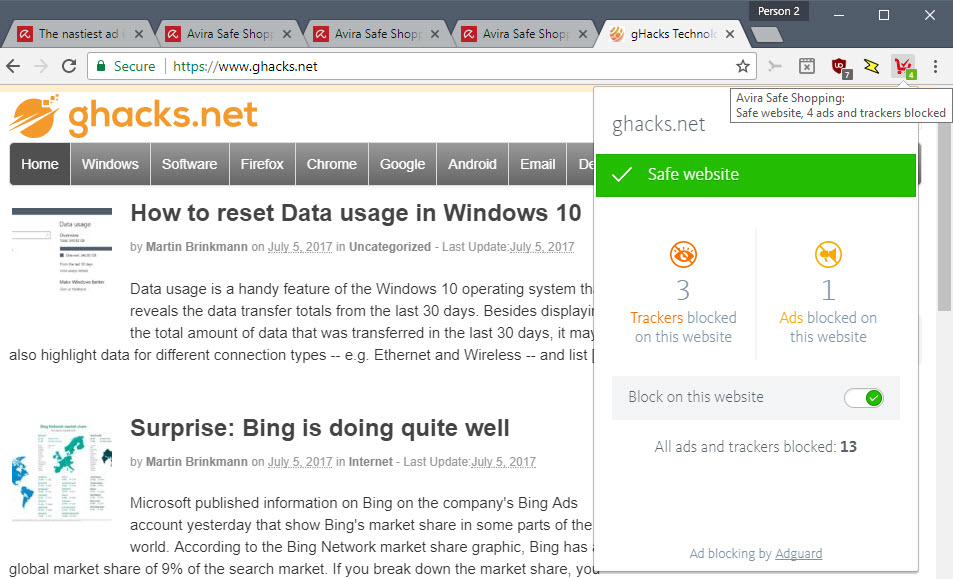Avira partners with AdGuard to integrate adblocker into products
Avira announced today that it has integrated adblocking functionality into the company's browser extensions for Google Chrome and Mozilla Firefox.
The decision to integrate an adblocker into company products came as a result of a study that Avira ran back in February 2017.
One of the takeaways of the study was that about a quarter of all hits could be tracked to the domains of five advertising networks. What this meant was that about 25% of all attacks originated from advertisement.
Avira ran the study on a sample group of 11.5 million unique active devices during February 2017. A total of 3.67 million detections were recorded by Avira URL Cloud in that time period; 2.4 million of those were malware related, and 817000 phishing related.
Of these 3.67 million detections, 894000 were traced back to five advertising networks. Avira names the advertising networks in question on the official company blog and mentions that the actual number of hits that can be traced back to advertising companies is larger as smaller advertising networks were not factored in.

Avira integrated an adblocker, courtesy of AdGuard, into company products as a response to the analysis of the studay. With more than 24% of attacks traced back to advertising, Avira hopes that it will have a big impact on customer safety on the Internet.
The company products in question, Avira Safe Shopping for Google Chrome and Avira Browser Safety for Mozilla Firefox and Opera, blocked malicious ads in previous versions already. The update introduces full ad blocking to the products to eliminate advertisement as an attack vector.
Updates for both browser extensions are already available. Existing users may receive automatic updates that incorporate the new adblocking functionality. New users may download the extensions directly from Avira.
The integrated adblocker comes with options to turn it off on select websites. Click on the icon in the browser's address bar to get started. It highlights the site's safety status, and the number of trackers and advertisements that were blocked on the page.
You can toggle the "block on this website" slider to disable adblocking on the site in question. The option to show "useful ads" in search results is enabled however. You may want to turn this off as well with a click on Settings and toggling the option.
Closing Words
Advertisement on the Internet is something that more and more Internet users don't like, and rightfully so. There is tracking, the fact that even the largest advertising networks may serve malicious ads, and obnoxious ads on top of all that.
If advertising companies don't get their acts together soon, and do something about all three of these issues, there is little hope that a sole focus on advertisement is a viable business model going forward.
It is clear that adblocking is on the rise. Google plans to integrate an adblocker in Chrome in the future that blocks all ads on sites with "annoying ads". While Google may be in the position to do something about it, considering that it is a major advertisement company and has a firm grip on the browser market, it remains to be seen if it can pursuade users and publishers.
Now You: How should publishers -- like Ghacks -- handle this? What business model would you suggest that is not advertisement based?
This article was first seen on ComTek's "TekBits" Technology News

- Log in to post comments